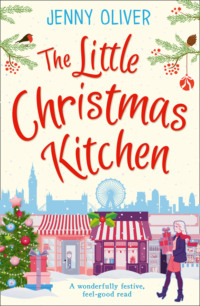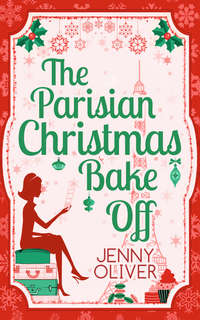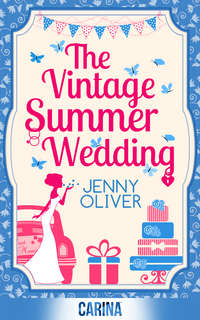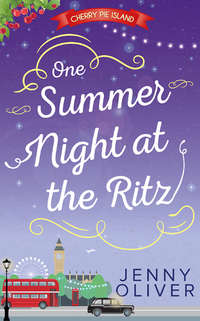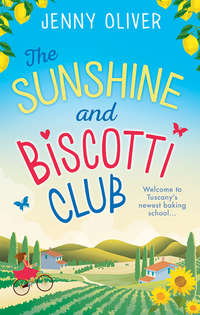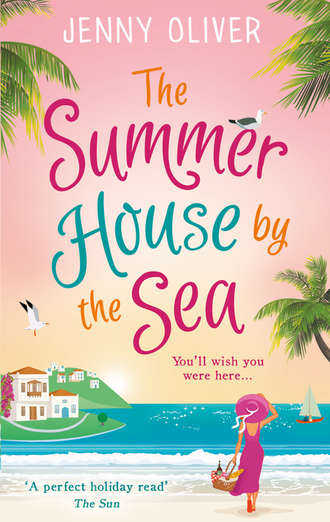
Полная версия
The Summerhouse by the Sea: The best selling perfect feel-good summer beach read!
So here she was, unzipping the pocket in her bag for the key, still on the familiar little black bull keyring, a miniature version of the huge cut-outs that loomed high above the roadside on her taxi journey from the airport, reminding her that this was Spain.
She looked across at the Café Estrella. In the darkness a TV flickered. Two old men played chess on a table in the shade. The blackboards were tired and smudged. There was no one there that she recognised. The waiter was drying the cups, his glance flicking between the TV and his few customers. She remembered nights when they’d danced on the tables.
She turned the key in the iron gate lock and walked up the dusty path, past the bougainvillea trailing unchecked over the fence and the pots of plump green succulents. Her fingers were shaking slightly and at the front door she fumbled the key, dropping it on the threshold. Bending down to pick it up she saw the shells. Pressed into the cement by her and Val: Our Summerhouse. She paused and rubbed one of the little shells with her thumb before taking a deep breath, picking up the keys and going inside.
The corridor was dark. The shutters closed. It was stranger than she’d imagined, being there alone. No smells of cooking. No vacuuming or absent-minded flower-arranging or kettle boiling. No stray cats purring. No telephone ringing or swearing at the TV, no diary scribbling or wild gesticulations about making no noise and coming to the window to look at what was going on in the street outside.
Nothing, Ava noted as she pushed the door open, just some junk mail on the mat and dusty dried lavender in a vase.
It was empty, unlived in, musty.
She walked straight through to the living room and opened the windows, the air instantly filling with the salty breath of the sea. She stood with her hands on the sill, looking out at the beach, at the rows of bronze-limbed sun-worshippers and children digging holes in the sand. Then she turned her back to the window and took in the familiar sight of a million old Spanish paintings wonkily filling every inch of the magnolia walls. The sofa, threadbare, spilling with cushions. The coffee table stacked high with big art books, stains on the glass from coffee cups. The shelves toppling with family photographs. The desk by the window covered with papers. Everything exactly as she remembered it but coated with a thin layer of sticky dust.
In the kitchen she tore off a bin bag and went through the fridge, chucking everything out. Then did the same in the avocado bathroom, binning the half-used bottles of shampoo, the night creams and the flattened toothpaste tube. The little half-bar of soap by the bathroom sink, heartbreaking but unusable, too closely tied to the once living.
As she looked, Ava did her best to ignore the growing weight pressing down on her, trying not to dwell on the life that had gone. She blinked away the vision of someone finding her own half-bars of soap, immediately glad that she’d chucked everything out for the airbnb tenant.
Her friends were WhatsApping. So jealous of your weather. How’s it going?
She paused in the corridor to reply, leaning up against the cool geometric tiles. Great. Amazing. It’s the kind of heat that makes you have to move slower. So relaxed.
It was sort of true. It was hot, sticky limbs weather.
No one replied. She checked the time. They were all at work, stressed and manic and attempting to double-screen in meetings. All of them jealous of her holiday, not realising that she was a little bit jealous of them.
She looked up and caught sight of the coat hanging by the front door: bright red brocade with a faux leopard fur collar, ankle length, cylindrical. It had swamped Ava as a kid in the same way it swamped Val in old age. She remembered it being tucked around her on the plane as she slept on the way back from visiting her mother in New York. She glanced to the right, almost to check no one was watching, then leant forwards so her nose was just touching the material and inhaled the scent of citrus, sandalwood and juniper. ‘The thing about men, Ava, is that they like the smell of power. Always wear cologne.’
And she realised, suddenly, that there would be no more such skew-whiff wisdom in her life. Unwanted at the time, unbearably poignant in retrospect.
She took a step back, turned and found herself staring up to the bedroom. The open door at the top of the stairs, the big gilt mirror on the wall, the dusky pink walls. Val’s room. The steps creaked as she walked. It was a lethal staircase, a flimsy banister with no spindles, and steps with open risers. As kids they would lie on their backs to slip through the gaps between each step and see how high they could go and still be able to cope with the drop to the floor. When Val caught them she banned the game, which of course didn’t stop them, but, as usual, it was Ava who got hurt when it all went wrong.
Now she paused on the top step, hand on the wobbly banister, and watched the sun battling its way through a gap in the curtain. There were velvet slippers tucked neatly under the bed waiting for feet. Faded ribbons tied on the gold, scrolled bed frame. A huge canvas of a black and white flamenco dancer leant against a shelf above the bedhead next to the window. Whirlpools of sun and dust eddied in the air.
Ava walked inside. She could see her reflection in the mottled mirror of the neat little Victorian wardrobe. She swallowed. She wanted to scoop everything up in her arms and walk holding it forever.
This was her family. Her stability. One of life’s guarantees. Like Christmas at Rory and Claire’s; the Starbucks next to Peregrine’s shop; Louise trying to be funny on WhatsApp. It was safe here. There was love here. Wonky advice and unending gossip, but a home whenever she needed it. And of course, someone who would talk, unendingly, about her mother; hours they had spent together remembering the stage lights, the smell of backstage at the theatre, the heat of the dressing room, the taste of make-up in the air.
Ava’s eyes trailed across to the carved wooden cabinet and a mirror above it draped with jewels; necklaces glimmered in the sunlight, bowls of rings shone on the surface next to a cluster of little ornaments and glass bottles. Shoe boxes snaked ladders up the wall.
Next to the wardrobe there was a door to a room in the eaves that she presumed housed things like the Hoover and ironing board. Walking over the tread-worn Indian rug, the sounds outside of beach playing and bells ringing, she went to turn the handle but the door didn’t open. The paint had almost melted it shut. She tugged a couple of times, about to give up, when it pulled free to the sound of splitting paint.
It wasn’t a room for the Hoover. It was a dressing room. Ava narrowed her eyes but just saw outlines in the darkness. She searched the wall for the light and when she finally found it, a tatty bit of too-short string, she clicked and a million sequins shone as the little ante-room lit up.
‘Bloo-dy hell.’ She put her hand up to her mouth.
A rail, filled with furs and rhinestone jackets, afghan coats and sequinned ballgowns, bowed under the weight. Pairs of shoes – patent, velvet, some with diamanté buckles – were crammed into every nook and cranny. Black-and-white-striped hat boxes were pushed on to too-small shelves next to baskets of silk scarves and belts curled like sleeping snakes. On a peg hung a fox fur, still with its little face and tiny claws, and next to him an open jewellery box filled with sunglasses. Everywhere she looked there was something: a lipstick that had rolled from its basket, a homeless brooch on a ledge, a bulging make-up bag with a zip that wouldn’t close, a teetering stack of glossy programmes.
Ava stared with her hands on both sides of her face. These weren’t her grandmother’s things but her mother’s. Things she had thought lost, gone, given away forever.
The smell in here was different. No more cologne but sweet, dark perfume. Guerlain’s Shalimar. The grooved glass bottle with its golden seal such a familiar sight in her youth. And lipstick, chalky and red. And the remnants of decadence: money and fur, couture still in dry cleaning plastic, expensive shoes once so carefully protected in soft white bags.
Ava could barely breathe.
It all suddenly felt completely different. No longer just the bittersweet task of packing away her grandmother’s long, beautifully lived life, but of being handed back her mother. As though she was standing there in the poky little room with her, hat shading one eye, lips slicked red, selfish, unreachable, magnetic, magnificent.
Ava backed out of the room, her hand gently closing the paint-cracked door. She walked fast, almost a trot, towards the staircase, the hallway and the front door, and seconds later was outside. Out into the bright heat of the sun, out into the noise of the beach and the shimmer of the wide blue sea, out where time kept moving and she could breathe like a normal person again.
CHAPTER 8
Rory was heartbroken.
It had taken less than an hour for the tweet and linking article to go viral.
Executive producer, Bruce Haslen, had arrived in his Range Rover, where they sat, rain hammering the windscreen.
‘I know you didn’t mean it, mate. But it wasn’t one of your brightest ideas.’ Bruce tapped the cream leather steering wheel.
Rory felt utterly sick. His whole career was being shredded before his eyes. People were questioning all his past work, sending him #VileRory hate messages, mocking up pictures of his face on a Christmas dinner goose. People were tweeting and retweeting faster than he could refresh Bruce’s iPad. All this was happening and he didn’t even have his own smartphone.
‘Can’t I just send out some kind of apology? Draft something with PR?’ Rory said, and even to his ears it sounded lame.
Bruce sat back and exhaled, staring up to where the rain battered the sunroof, then turned to look Rory’s way. ‘Too late for that, I’m afraid. They’re already placarding. One lot have made a human wall of protection around the nest.’
Rory put his head back against the plush leather and shut his eyes. ‘Well at least something’s happening, I suppose.’
Bruce gave a half-hearted attempt at a laugh. The rain thrashed around them in the darkness.
‘I’m sorry, mate,’ said Bruce.
‘Not your fault,’ Rory said. ‘Bloody Petra though – who tells their Daily Mail boyfriend about something like this? Why didn’t I know she was shacked up with a journo?’
‘New romance, evidently.’ Bruce shrugged.
Claire ran out of the house with a brolly and tapped on the window. ‘Are you all OK?’ she asked. ‘Anyone want a cup of tea? Glass of wine?’
Rory shook his head. ‘No, I’m just coming back in.’ He barely looked at Claire as he opened the door, part of him still annoyed with her for throwing his phone down the toilet, which, given the escalation of events, he knew wasn’t healthy or fair but he couldn’t help it.
Bruce started the engine. ‘We’ll reconvene in a week and see where we’re at. I think you’re off the swans for good, but I’m sure you’ll be fine for the jellyfish.’
Rory couldn’t see how he’d be fine for the upcoming Jellyfish Apocalypse documentary. People remembered. They’d say that he’d somehow warmed up the ocean and bred them himself to create the epidemic.
Once inside he disappeared to the bedroom and sat refreshing his Twitter feed on his laptop. The Eskimo-snow documentary-maker had refrained from commenting on Rory directly, but when tweeting about his exciting new project – which it transpired was a voyage across the Pacific Ocean in search of Plastic Island – he added the hashtag #honestwork, which made Rory cover his face with his hands and shout with frustration.
‘You should go to sleep,’ he heard Claire say as she came into the bedroom.
He ignored her. Refreshed the app again. His Twitter feed couldn’t even register the number of retweets and comments about him there were so many. He also had Ava’s Instagram feed open in another window and he stared at a picture of their grandmother’s house. ‘I can’t believe she went anyway, even though we agreed she wouldn’t. How could she?’
‘You need to turn it off, Rory, it’s driving you mad.’ Claire got into bed and turned her sidelight off, casting the room into gloomy darkness. Rory’s face was lit only by the blue glow of the laptop.
‘I won’t be able to sleep.’
‘You haven’t tried.’
‘I know I won’t be able to.’
Claire shuffled up the bed a bit. ‘They say that blue glow stops the melatonin that helps you sleep.’
Rory gave her a look.
Claire breathed in through her nose and out again. ‘It’ll be OK, Rory. I mean, maybe it’s not a bad thing? Maybe it’s a chance to do something new?’
Rory felt his jaw clench. ‘I don’t want to do something new. This was my dream. I was living my dream and I just wanted to keep on living it. Forever. And ever. Till I died or got so old that I couldn’t physically manage to do it, but even then would know that I could do it if some new technology was created to keep me alive. Jesus.’ He bunched his hands into fists. ‘I don’t want it taken away from me.’
Claire was looking up at him from her half-sitting position. ‘We’ve got to find a bright side to this.’
He stared at the pattern on the curtain, just visible in the black. ‘There is no sodding bright side. My life is basically ruined.’
‘Well why did you plan to kidnap the bloody goose?’ Claire bashed the duvet with her hand then immediately sighed, as if she hadn’t meant to say what she’d said. Like she’d been holding it in. After a pause she said, ‘The way you talk about it, it’s like you have no acknowledgement of the fact you still have us, you still have your home. This is one part of your life, Rory, and we’ll fix it.’
They both stared straight ahead at the curtains, the only noise the sound of rain tapping on the window.
‘And Rory,’ Claire said a little softer, turning to look at him while he stayed staunchly turned away, ‘what use is a BAFTA if it’s for something you’ve faked? Surely it would ruin everything about accepting it. You’d stand there and do some speech and know you’d packed the stupid goose off in a black bag in the middle of the night.’ She shook her head in disbelief at the very idea. ‘Christ,’ she said, ‘I don’t even know who you’re doing it for any more, because it isn’t for me or Max. I don’t think it’s for you because you don’t seem to be particularly enjoying it. You used to love your job, Rory. And that made all the sacrifices we made OK. But look at you . . . You’re tired and stressed and angry. You’re not even making films you like any more. And God, if any of this is to impress your father then, do you know what? You could just go and buy one of those cheap knock-off statues and tell him you won. He wouldn’t know the difference.’
Rory didn’t reply.
Claire huffed a frustrated breath and slid back down the bed, rolling away from him to go to sleep.
Rory listened to her breathing in the quiet. He could tell she was faking the slowness of her breaths to make it seem like she was asleep. He wondered if maybe she was crying.
Usually he’d lean over and see, but this time he didn’t. He went back to refreshing. Over and over. Watching the tweets tumble down his feed, vitriol and hatred all directed at him.
He felt like he was outside his body, looking down on himself sitting in bed, lit blue, with his wife silently crying beside him. He was suddenly overwhelmed by a feeling that he hadn’t had since he’d sat on the floor in the corner of his bedroom after learning that his mum was leaving. He felt the same hot, wet tears of shame. Of utter, overwhelming helplessness.
He felt Claire stir.
Tears were now rolling uncontrollably down his cheeks, hitting the computer, the sheets, his T-shirt. He tried to wipe them away but it was physically impossible, there were more than he could feasibly hide.
‘Rory?’
He looked away.
‘Rory?’ Claire sat up, her voice concerned.
He shook his head.
He felt her arms snake round his shoulders and move down around his upper arms as she hugged his back and he tried to pretend that he wasn’t crying and her hands weren’t getting soaking wet.
CHAPTER 9
Ava had caught the bus into town and spent the afternoon trying to escape the scorching sun. Immersing herself in little tourist shops and the swanky new department store, trying on clothes she didn’t need and drinking too much coffee. The thought of going back to her grandmother’s house was so overwhelming that she considered booking into a hotel, but the practicality of her suitcase still being there made her get the bus back to the little beach town again.
She walked down the path to see paddle-boarders gliding out into the dusk on ice-flat sea, barely leaving a mark on the water. It was late and Nino’s, the new restaurant, was still going strong. Couples queued for tables while the heat enveloped them like candyfloss.
She took a seat at the run-down Café Estrella, where in contrast she was one of the only people at a table. The old men who’d been playing chess earlier now sat in the corner smoking cigars, while a couple of guys propped up the bar.
Ava was just Googling Nino’s reviews when a voice said, ‘Ava? Darling, is that you?’
‘Flora!’ Ava turned in the direction of the woman wandering up from the beach. Her hair wet from the sea, an old black sarong with faded pink flowers tied across her chest, ratty old plastic sliders on her feet.
‘May I?’ she asked when she reached Ava’s table, pointing to a chair.
‘Of course,’ Ava nodded. ‘It’s your café,’ she added with a laugh, surreptitiously closing the TripAdvisor page of glowing reviews for Nino’s.
‘I barely saw you at the funeral,’ Flora said, squeezing the water from her hair.
Ava remembered spotting Flora in a veiled black hat and waving across the throng of mourners. Now though, she had to suppress her shock at how much Flora had changed. This was a woman who Ava had seen reduce grown men to gibbering wrecks. Her own brother had spent a summer filming the café for his degree show and followed Flora around like a puppy.
A British food writer, Flora was famed for her looks. Her figure. Her glossy blonde hair and perfect pout. But instead of the voluptuous glamourpuss, sitting in front of Ava was a really tired-looking middle-aged woman with weathered skin and hair in need of a retouch.
‘How are you?’ Ava asked.
‘Hot,’ Flora said, crossing her legs and sitting back in her chair, fanning herself with the menu. ‘Old.’
Ava shook her head as if she didn’t know what she was talking about.
Flora called to the waiter to bring over some drinks. ‘Sherry?’ she said to Ava, who nodded.
Ava was struggling to work out what Flora was doing late-night swimming while her café slowly faded away, losing all its trade to the place on the opposite side of the path. ‘They’re new,’ she said tentatively, gesturing towards the heaving restaurant.
Flora didn’t turn to look. ‘There’s three of them who run it. City boys. Came from Barcelona. Stole my business.’
‘Oh,’ said Ava.
‘Yes,’ said Flora. Then she sighed. ‘No. Who am I kidding? It hasn’t been the same since Ricardo left and now I’m stuck with the bloody place.’
Ava did a sort of half-neutral, half-sympathetic face. While it was public knowledge that Flora Foxton had fallen head over heels for up-and-coming Spanish chef Ricardo Garcia on a cookery show she’d filmed across the Mediterranean, Ava wasn’t sure how much she was meant to know about events leading up to Ricardo’s departure. It was safe to say she knew every single minute detail, as relayed by her grandmother in unnecessary whispers over the phone, as if Flora might hear them through the wall, across the path and all the way over at the café.
Valentina Brown had never trusted Ricardo. She had scoffed on the phone when he had presented Flora with a knot of turquoise thread instead of an engagement ring. Ava had said that she thought it was quite romantic. As had Flora, clearly, as she proceeded to solely finance the set-up of the very successful Café Estrella from the profits of her once-bestselling cookery books, to allow Ricardo to show off his modern take on classic tapas. The critics mocked the location but Ricardo drawled in interviews that ‘People will travel for the best’ and refused to budge from his little beachside idyll. It was this same arrogant passion that had made Rory’s graduation film such a success. And Ricardo had been right. People had come. The café had garnered a coveted Michelin star. But while whipping up his fancy new tapas and proclaiming himself the saviour of Spanish cuisine, Ricardo’s growing reputation had put him in the spotlight of the rich and famous, who whisked him off to prepare birthday feasts on mega yachts and cater weddings in the Hollywood Hills – all a world away from Flora and their little beach café.
When Flora told Val that Ricardo had left her for a very young American underwear model who he was now living with in Chicago, Val had whispered on the phone to Ava that she was not surprised one little bit, and added with quiet confidence, ‘Never trust a man who gives you a piece of string instead of a ring.’
Now, as Ava sat opposite Flora, she saw the heartbreaking reality of what had previously just been idle gossip. ‘I’m really sorry,’ she said.
‘Well, what are you going to do?’ Flora sat back in her chair, piling her damp blonde curls on top of her head and wrapping them with an elastic band from her wrist. ‘People came here for him and, well, he’s not here, is he!’ She looked round at the empty café tables. ‘And that lot, they’re young.’ She nodded her head backwards towards Nino’s. ‘They’ve got the energy to triple fry their chips and serve their oysters in shot glasses. Which frankly, to me, sounds disgusting anyway, but people seem to like it. They talk about it a lot.’ She gave Ava a wry little look and then, glancing out to the sea, said, ‘I just hide in the back nowadays, ghost-writing cookery books for skinny celebrities and avoiding my accountant.’
Ava laughed.
Flora smiled. ‘But it’s OK. How are you doing? Missing Val? She was bloody annoying half the time but it’s not the same without her.’
‘I know.’ Ava nodded. The sherries arrived, the waiter setting them down on little paper coasters, half an eye on the beach, studiously ignoring them. ‘Thanks,’ Ava said. He didn’t reply. Flora rolled her eyes as if there was nothing she could do about him. Ava smiled into her sherry, then waited until they were alone again to say, ‘It’s harder than I thought, being in the house. There are just so many memories.’
Flora took a sip of her drink. ‘And she had a lot of crap.’
Ava, who had been expecting sympathetic words of advice, snorted into her drink. Flora laughed, as if she’d taken herself by surprise.
‘She does have a lot of crap,’ Ava agreed, liberated. She didn’t mention her mother’s room; like stepping through the wardrobe into Narnia, it was her precious secret to keep.
Flora smiled. ‘Just go in, ruthless, and chuck it away. I think it’s the only way. Val wouldn’t want you poring over her stuff. She knew it was tat, half of it. I was with her at the boot sales when she bought it. Bag it up, bin it and enjoy the sunshine. That’s what she’d have said. Don’t you do this kind of thing for a living?’
Ava thought about her job. She tried to compare Val’s house, with all its knick-knacks, to the palatial New York townhouses and cliff-top ancestral piles in the Scottish Highlands where she would pitch up for valuations and contents auctions. Places where she was handed plastic shoe covers at the door and white gloves to wear when inspecting the art or browsing the library. While she did think about who had sat in the pair of French Louis XIII armchairs she was bidding ten grand on, or who had lit the £20,000 Italian Baroque candelabras, their lives were more often than not secondary to the wealth. What they left behind was more valuable than their memory. Whereas with Val, every item was a manifestation of her self. Every chipped vase and tacky flea market print seemed to carry her voice. ‘There’s no more room in my house. But I like it. You like it? Not fancy enough for your lot of course. I’m going to have it. Where I’ll put it? But I’m going to have it.’


